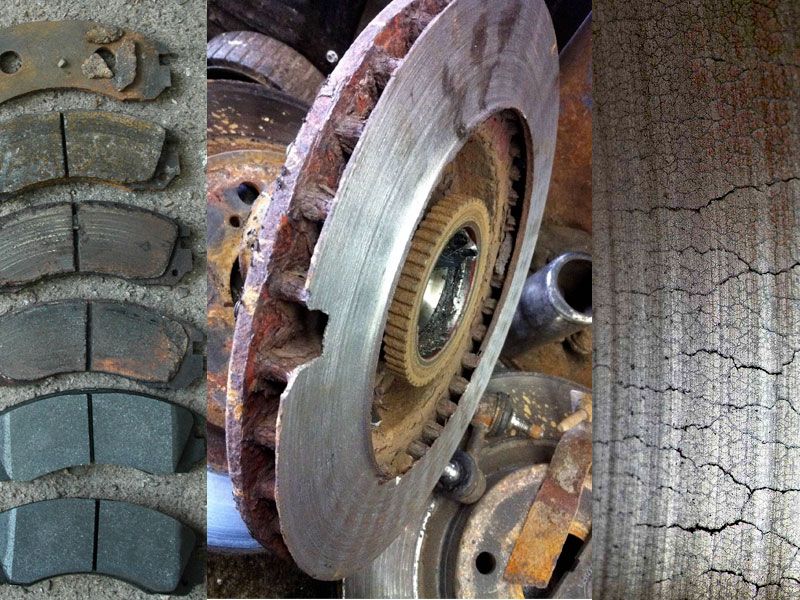Brake Problems And Symptoms
FEBRUARY 18, 2016

Brake Problems & Symptoms
Why is it important to get a brake inspection at the first sign of trouble before you start getting brake problems?
If your car starts to emit strange sounds, abnormal smells, feels different — start investigating the issue sooner rather than later and risking the condition getting worse. Delaying small repairs often leads to bigger, more expensive repair bills down the road and more brake problems . For example, when brake pads and shoes stop working, the rotors can become warped and damaged, and this metal grinding will shorten the life of properly working parts.
Paying close attention to sounds, sensations and smells will help you find brake problems:
- Squealing, screeching, or grinding sounds usually indicate your brake pads & shoes need an inspection. Address this before the pads wear out and cause damage to other parts, which will only make repairs more expensive later on.
- Pulsation or vibration in the gas pedal or steering wheel. This common symptom often points directly to a brake problems. Don’t wait too long to get this checked out because if your rotors become warped from grinding metal parts, additional repairs may be necessary. If you are experiencing this unpleasant problem, come see our professionals today.
- Pressing the brake pedal down harder and farther to stop. This symptom used to be more common, but if you find yourself pushing down the brake pedal farther and using more pressure and time to make a complete stop, your brake pads definitely need to be inspected or possibly replaced. Don’t wait until the day you have no more stopping power in your brake pedal.
- The smell of burning rubber near your tires. If you’ve begun to notice a pungent, burning smell near your tires, head directly over to our nearest automotive shop. Unfamiliar, strong smells like this could mean part of your brake system is compromised, broken, or worn down. With a quick inspection, our certified technicians will be able to see what part of your braking system is causing this smelly symptom and make any repairs necessary..
- Brake warning light. If the warning light for your brakes turns on, come see us and ask about a free brake inspection.
What other warning signs can I look for if I think my brakes are wearing out?
You can check your vehicle’s owner manual for any additional warning signs for your specific make and model. Since there are many nuances to different braking systems, we’re not going to overwhelm you with worst case scenarios and model-specific symptoms. No need to go through the trouble of detailing and diagnosing a symptom that is uncommon and difficult to detect on your own.
If you have more questions about your particular braking system that weren’t covered by these questions, please call your local Bullitt Automotive and schedule a brake inspection. After a complete inspection, we’ll be able to diagnose the brake problem and give you an estimate for any repairs.

What can I do to make my rotors last longer?
- It’s smart to want to learn as much as you can about your vehicle so you can care for it better and preserve it. So here are some helpful tips to keep your brakes working longer.
- No more stop and go grind. Driving in the city usually means stop and go traffic, which means brakes wear down quicker. Simple as that. Braking frequently can wear brake pads down faster, which then warps rotors more quickly. If this sounds like your driving habits, take your vehicle in at least once a year to check for problems.
- Don’t ride your brake all the time. Know someone who can’t keep their foot off the brake? We all do. Especially at higher speeds, riding the brake can quickly wear out brake pads and warp your rotors due to the excessive heat created by frequent braking.
- Keep with the pace of traffic. Your brake parts with thank you for obeying speed limits and driving more conservatively. Avoid tailgating and leave enough room to decelerate, so your brakes will last far longer. This generates far less heat, friction, and wear — which will help preserve both the pads and the rotors.
- Curb aggressive driving habits. Aggressive driving forces you to do a lot of last minute braking. All that excessive heat from sudden braking is cooking your rotors. If you continue to drive this way, you’ll pay much more in replacement brake pads and rotors. .
- Empty your vehicle trunk or bed. Overloading your car with extra weight can greatly affect your brake life. Remove the things you don’t need, like that heavy box of clothes or your portable grill. You’ll be able to stop faster and, without all the extra stress and weight, your brake system will last longer, too.
After new rotors, brakes, pads, calipers, etc. are installed, how long will they last?
- Just like people, health and habits have an impact on the lifespan of your vehicle parts as well. Taking care of your vehicle and driving carefully will help replacement parts last longer.
- Rotors and calipers are built for endurance: These tougher components can last for years if you regularly maintain your vehicle. But be aware: wearing down your brake pads completely will only damage rotors faster and require more costly repairs causing more brake problems.
- Brake parts take time to wear down. Calipers can last for the long haul, but the real enemies are corrosion and heat. Not properly maintaining your vehicle, stop and go driving in the city, weather and erosion, metal on metal grinding, and even road salt can all lead to corrosion. Schedule an annual inspection and check your owner’s manual for maintenance recommendations.
- The balancing act. You may have detected a shift in your vehicle’s weight distribution if the suspension system’s shocks and struts are off balance. This can be seen when the front end dips after you brake. The distance needed to stop may also be longer, making your front brakes to wear out even quicker.
- Pulling to one side while braking: If your vehicle is pulling to the right or left when pressing the brakes, it could indicate your brakes or suspension are not functioning properly and need to be inspected.
More information on Brakes:
More Services we offer:
Loading ...
Missing business hours data / Error occurred while getting the data.
Our Location
Have Trouble Finding Us?
Loading ...
Missing nap lines data / Error occured while getting the data.
